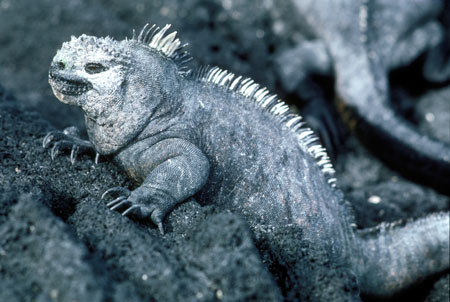
Marine iguanas, the world's only sea-going lizards, are found only in the Galapagos Islands. They are excellent swimmers and feed from seaweed on the rocks both in the sea and in tidal pools. Like all reptiles, they are cold-blooded creatures, so feeding in the relatively cold water found off the Galapagos Islands presents them with the problem of maintaining sufficient body heat. As with other other diving animals, a marine iguana's blood recedes from the surface of its body during a dive to preserve heat. Its heart rate also slows considerably.
The Galapagos Islands are volcanic. The rocks are consequently black and tend to absorb the heat of the equatorial Sun. When returning from a dive, the iguana's congregate to bask on the rocks and regain lost body heat. At midday, they turn to face the Sun and hence minimize their absorption of heat.
Whilst feeding in the sea the animals swallow large quantities of salt water, so they have developed special glands located near their nostrils that accumulate and then facilitate the removal of the salt from their bodies. As the animals bask on the rocks they sneeze out a salt spray, some of which lands on their heads and faces. This gives them their characteristic white face masks.
Approaching and photographing the iguanas is relatively easy. In common with most of the creatures of the Galapagos Islands they have little or no fear of human beings, so it is an easy matter to approach within a few metres. In the mornings, before the Sun is too high, the iguanas are torpid and reluctant to move. This is consequently a good time to take photographs. Incidentally, the image above is a colour photograph!






